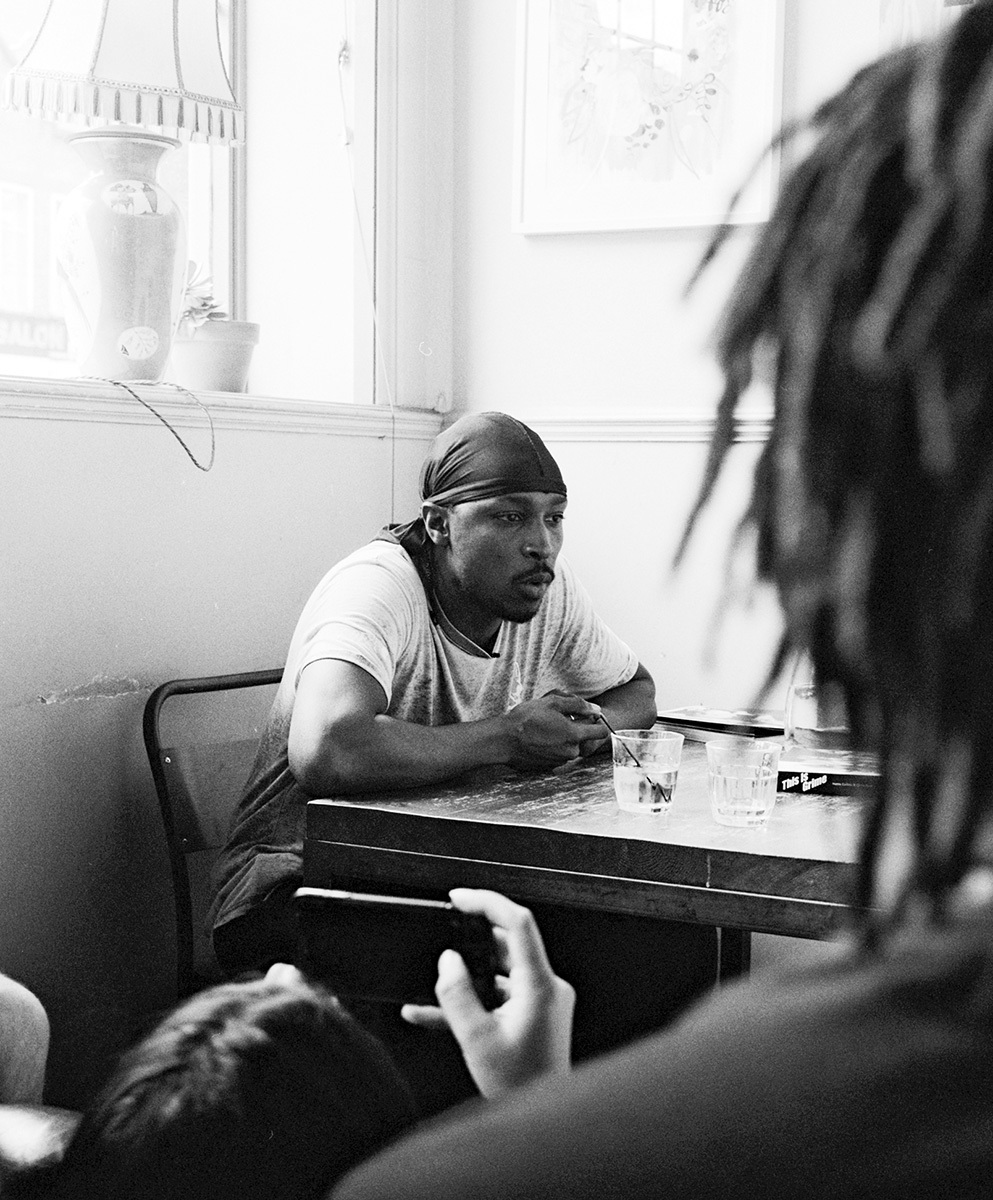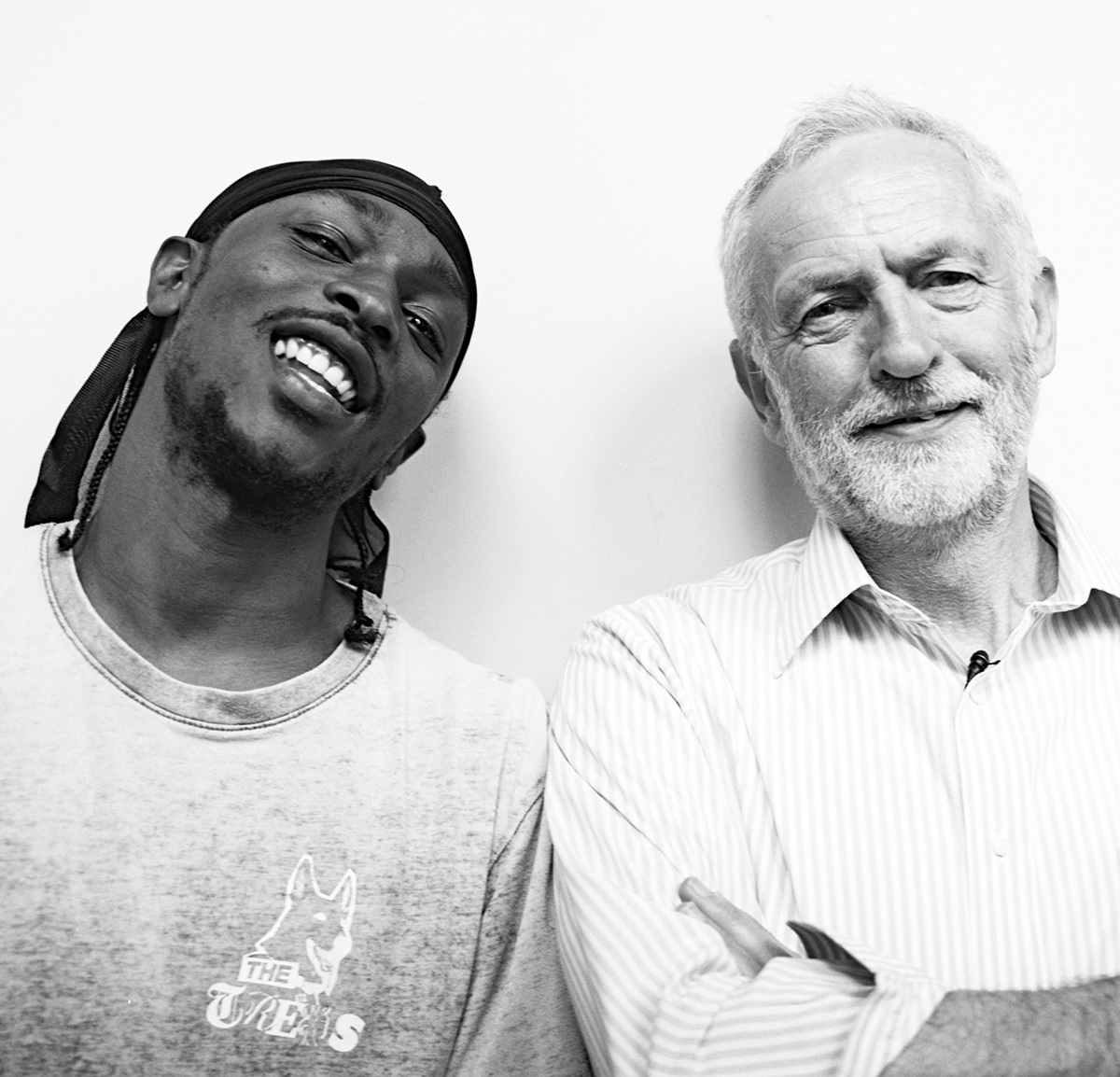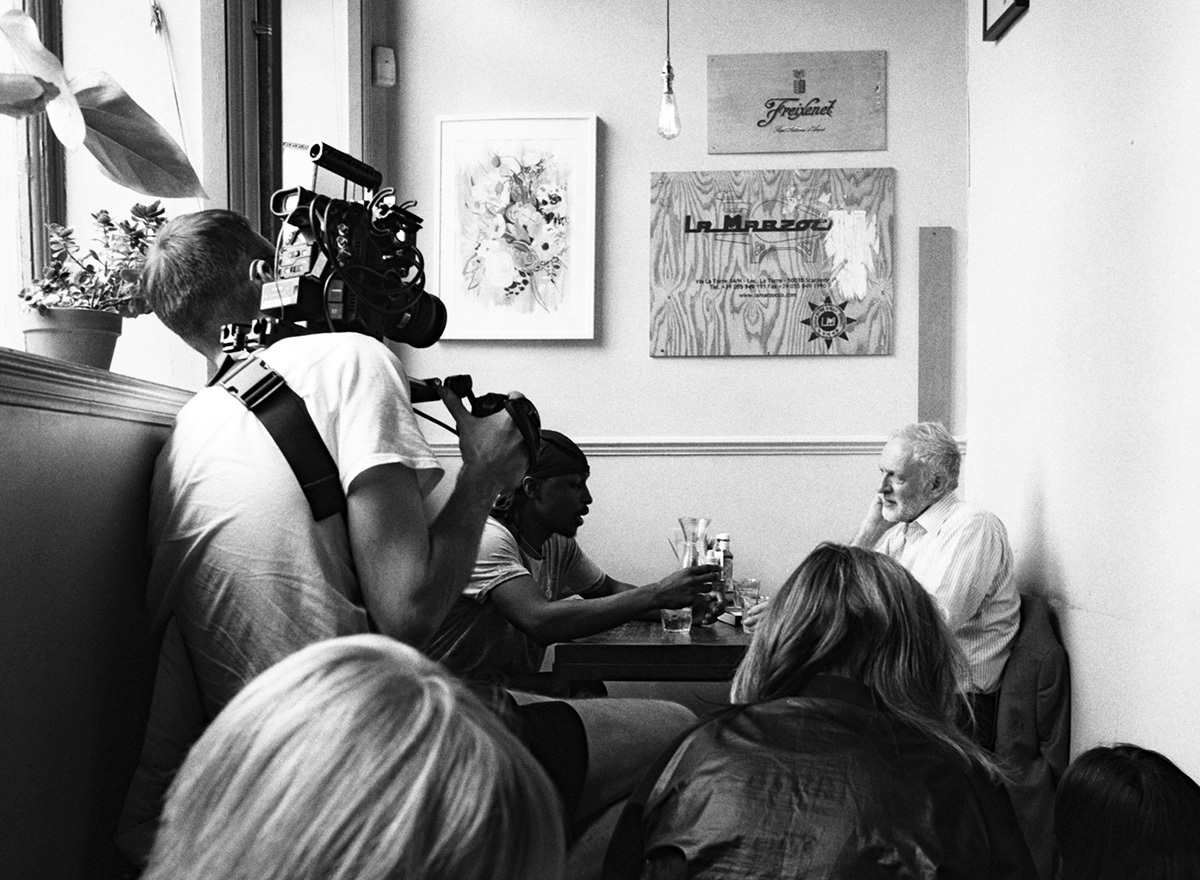JME: JC! What’s going on, man?
JC: Lovely to see you! Thanks for coming along.
JME: No, thank you for having me, bro. Seriously.
JC: On Holloway Road!
JME: Yeah, yeah! This is my local. There’s a vegan Chinese over there that I go to.
JC: Are you vegan?
JME: Yeah. And it’s weird because I’ve always been up and down this area, all the time growing up. Now there’s people shouting “JME” at me outside and I’m like, boy, they don’t know who I’m going in to meet! I’ve got a million things I could ask you. First of all, I’d like to just say I’m a grime artist. I make music in the UK. Underground music in the UK.
JC: What took you into that?
JME: DIY. Just doing things myself. My parents are both Nigerian immigrants. Came here and everything we had was, like, homemade. It kind of rubbed off onto us. They kind of rubbed off onto our whole generation of youth today. We do things ourselves. Especially with the internet.
JC: How did you get the facilities to make music?
JME: My dad used to build computers. He was IT guy. And, yeah, he built me a computer at home, a really basic computer, and I downloaded a programme to make beats on. We used to stand in the front room, or in my cupboard upstairs, and just make beats ourselves and recite the lyrics to the beats. The music genre had no name. It was just us making music. And as time’s gone on it formed into what we now call grime music.

JME: One thing that I really want to make sure I do say, is that I’ve never voted before. Ever. I’ve grown up, like, making the best out of what I’ve got and being optimistic with what I’ve got. Especially with politics, I always thought, no matter what happens with politics, we’re going to have to make the best of that situation. So sometimes we feel like we don’t need to vote. It doesn’t matter. No one has our best interest at heart anyway, so whatever happens we’re going to still struggle, we’re still gonna grind, we’re still gonna come through, and flourish at the end. Whereas now, we seem to be seeing someone that we can actually trust. Someone that’s human!
JC: Well, political change doesn’t always come from politicians does it?
JME: Course not!
JC: It comes from everybody else.
JME: How come there’s not one place where a party can put their policies and then you can just compare policies of parties so it makes it black and white for people to see? It’ll help when somebody does get into power, people comparing what they’ve done with what they said they were going to do.
JC: I like that, I like what you’re saying there because I’ve been thinking about this a lot. Obviously we’re going to have our policies out with the manifesto on Tuesday. But I was thinking that, in government, I would want to measure our success or otherwise, by a reduction in the number of homeless people, by the living standards of the poorest, by the opportunities of children growing up in the poorest households, so we actually say, listen, you’ve all got the same chance. At the moment, if you cut the money for schools, and cut the money per pupil in all the schools, and the schools then say, raise the money from the parents, then where you grew up in Tottenham, if you had an appeal letter to parents saying, the school’s hard up, give them some money, the parents love the school, they love the kids, but they’re not going to have much money to give. Whereas if you do the same thing in a wealthy part of the country they’ll say, ‘Well, that’s okay! I’ll give them a hundred pound a month.’ So what happens five years down the line?
JME: The poorer schools end up…
JC: The poorer schools have got fewer teachers, fewer assistants, less equipment. Possibly sold off some of it’s land. That just makes inequality worse. It’s up to us to make sure the money is directed where it’s needed. And so I would want us to be measured against some tough things that we set ourselves from the very beginning. And also the impact you make on your policies.

JME: Why do you think people vote Conservative?
JC: Why do people vote conservative? They probably have a view that someway or other their status is going to be protected. We’re after making sure there’s opportunities for everybody. And I would hope people understand that what we’re trying to do is making things fairer and rebalancing things. Seems to me all very obvious. Voter registration dropped off over many years, particularly amongst young people. In the last election, less than half of under 25 voters, who are eligible to vote. I want it to be much, much higher.
JME: I think where the disconnect lies is, we think there won’t be a difference. That’s the honest truth. If someone was to ask me why don’t young people vote, it’s because they actually think it won’t make a difference.
JC: They don’t see any resonance in what they think and do, with a political system that’s out of touch with them. Is it the language that politicians use or is it just the system that is so remote and removed? Or a bit of everything?
JME: We feel like, even if who we want in power ends up in power, they can’t do anything, you know? That’s what we think. So, my question to you is, what would we notice? What would, say, young Kevin in Edmonton realise? What difference could be made? What differences would he actually realise, that would affect him direct him if Labour and then you were in power?
JC: Housing first. We’ve got a housing crisis in Britain. The worst symptom of the housing crisis is the number of people sleeping on the streets. And that’s a symptom that’s not the whole story. In the big cities, London, Birmingham and elsewhere, very expensive private rented accommodation, working class families can’t get council housing, not enough of it. Benefit cap comes in, they get forced to move out, so you get…
JME: Chain reaction.
JC: Social cleansing, chain reaction. And the only way that I can see of dealing with this is to rebalance the housing policy, by putting money into building council housing, to give people security in the private rented sector and not have new builds for people to buy, that are completely unaffordable. So, housing first. Secondly, education. Many have been totally put off going into higher education because the debts are going to be too great.
JME: I know that firsthand as well.
JC: You know that firsthand. And other countries don’t see it that way. Because if somebody goes to university and gets a huge debt, well, obviously they’ve got that debt burden. But also they’re put off going there. If talented young people don’t go to university, where are tomorrow’s engineers and doctors going to come from? And we’ll lose out. It’s just short sighted. I want to invest in people. So those are the two crucial areas. But the other one that’s more general is really about opportunities in society and giving people space to be creative as well. We’re talking a lot about your music and music and innovation. It’s also about giving people that space to be creative and that political space to be creative as well. And I see that very passionately.
JM: Question for you, why is it, do you reckon — I don’t know this first hand, but I’ve been told — why isn’t that you’re not popular within Labour itself? You’re not seen as somebody that you should definitely go ahead and lead.
JC: Well, the Labour party changed its electoral system so that the party members and supporters can vote for who the leader is, not the MPs. And so, when we lost the 2015 election, there was then a discussion about who the leader would be. Some of my friends put me forward. And we had to get the support of 35 Labour MPs to be nominated.
JME: In the party?
JC: In the parliamentary party. That was not to be elected, that was to be on the ballot paper. And then I was given 200-1 against chance of being elected leader.
JME: Wow.
JC: Then we started the campaign. And we just did public meetings and rallies all over the country. There was a challenge put up to me. They said they wanted to have a different leader and another leadership election was held last year. And I stood again and won with even more votes.
JME: Again?
JC: Yeah. An even bigger majority. And so there’s actually a great deal of exaggeration by some media. In reality, there are half a million people who’ve joined the labour party, we’ve got a Labour candidate in every constituency and we’re absolutely on it to win this election. That means getting people registered to vote, particularly young people who are not registered. Getting them to vote. And all our policies will come out this week, but basically it’s what I’m talking about. It’s about housing, it’s about schools, it’s about jobs, it’s about opportunities, it’s about cultural freedoms in our society.
JME: And now there’s a chance for a bit of change. I have to admit, I’ve never spoken about politics before.I haven’t ever really told anyone to vote. In fact, I’ve actually told people not to vote. I’ve said there’s no point. Like, I told you before. But this time around, I think there’s a difference, and I hope something good can come of it, man.
JC: Thank you very much.
JME: Thank you for speaking to me. Seriously, on the level. Thank you for speaking to me.
To vote in the General Election on 8 June, register by 11:59pm on 22 May here.
Credits
Photography Olivia Rose
